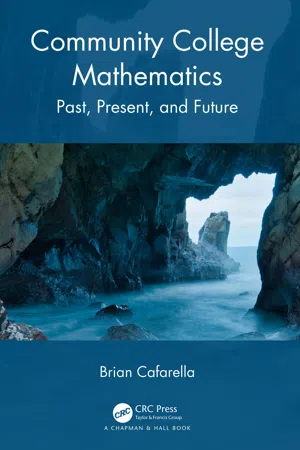
- 256 pages
- English
- ePUB (mobile friendly)
- Available on iOS & Android
About This Book
This book explores the rich history of community college math with a specific focus on gatekeeper math classes. Gatekeeper math classes include courses such as college algebra, introduction to statistics, and all developmental math classes. For community colleges, successful completion of these classes is imperative for student retention.
This book presents a decade-by-decade analysis of the history of community college mathematics. The author employs a mix of conceptual, empirical, and quantitative research. The empirical research stems from interviews with 30 community college faculty members from seven community colleges.
From the 1970s to the pandemic in the early 2020s, the book explores math curricula as well as trends, initiatives, teaching practices, and mandates that have impacted community college math. The positives and negatives of such trends, initiatives, and mandates are presented along with suggestions on how to apply such knowledge going forward.
The author addresses the key questions: How can we build a future model for community college gatekeeper math classes that is both successful and sustainable? Additionally, how can we learn from the past and the present to build such a model?
This book will be ideal for students in graduate programs focusing on community college leadership or developmental education leadership as well as all those hoping to improve success rates in community college mathematics programs.
Frequently asked questions
Information
Table of contents
- Cover
- Half Title Page
- Title Page
- Copyright Page
- Dedication
- Table of Contents
- Preface
- Author
- 1. Higher Education: From the Elite to the Mass to the Universal
- 2. The 1970s: Mathematics and the Community College Become Acquainted
- 3. The 1980s: Community College Mathematics Reaches New Heights
- 4. The 1990s: Mathematics Enters a New Age
- 5. The Aughts (2000–2009): A Time of Reform and Turbulence
- 6. The Teens Part 1: Turbulence and Change Continue
- 7. The Teens Part 2: Alternative Pathways Lead to Signs of Reform
- 8. Teaching during the Pandemic: What We Experienced and What We Learned
- 9. Learning from the Past and Present
- 10. Suggested Mathematical Models for Sustaining Success
- Appendix A: Design of the Study
- Appendix B: Lead Questions for Participants (1970s–2009)
- Appendix C: Lead Questions for the Participants (2000–2019)
- Appendix D: Lead Questions for the Participants (during the Pandemic and Beyond)
- Appendix E: Demographic Questions
- Index